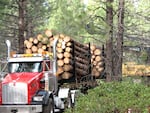The resignation of Oregon’s top forestry executive last week comes at a pivotal moment for environmental policies in the state.
Lawmakers are a week away from convening a legislative session that’s expected to tackle Oregon’s critical wildfire funding issues. And forestry officials are scrambling to finalize two major overhauls to endangered species protections on public and private lands.
But for many, state forester Cal Mukumoto’s resignation didn’t come as a surprise, even for Mukumoto himself.
“Without the confidence of the Legislature and the governor’s office, I think it didn’t leave me many options but to resign,” Mukumoto said.
The Oregon Department of Forestry, which the state forester oversees, has made headlines over multiple controversies in recent months. During last year’s historically expensive wildfire season — when 1.9 million acres burned, racking up $350 million in costs — the department ran out of cash before it could pay contractors who worked the fires. Lawmakers had to hold a special legislative session to fast-track $218 million to the department so it could pay its debts.
A month later, The Oregonian reported the department was sending 20 employees to a training at a luxury resort in Bend — while the department was embroiled in at least two workplace conduct investigations, also reported by The Oregonian.

Calvin Mukumoto
Courtesy of Mason Marsh via Oregon Department of Forestry
“Bad press is bad press,” Mukumoto said. “We need to move forward and get support from the Legislature and the governor’s office behind this department.”
Mukumoto wouldn’t confirm if Gov. Tina Kotek’s office asked him to resign.
Kotek’s office declined an interview request, instead offering a written statement: “Oregonians deserve strong leadership to chart a proactive path to protect our state’s forests for the benefit of healthy ecosystems, thriving communities and a strong economy.”
Mukumoto’s resignation is effective Jan. 23. The Board of Forestry is expected to work with Kotek’s office to recruit candidates, then the board will have a final say in who gets to take the helm. It’s likely to be a months-long process.
In the meantime, Kate Skinner, currently the interim deputy state forester and longtime Tillamook district forester, will take over as acting state forester.
‘He’s had a target on his back ever since’
Mukumoto was named forester in 2021 after the departure of Peter Daugherty — who also resigned after losing state lawmakers' confidence over the forestry department’s financial insolvency.
The state forester has long been a highly political role, juggling policy input from Oregon’s robust timber industry, timber-dependent counties and environmental advocates.
“There’s nothing about the job that is easy,” said Board of Forestry chair Jim Kelly.
The Oregon Department of Forestry manages 745,000 acres of forestland, deciding which areas can be logged and determining rules for protecting vulnerable species. The agency is also charged with fighting fires on 16 million acres of forests that are mostly privately owned.
As Kelly sees it, Mukumoto’s political career as state forester took a nosedive after he voiced support for a plan that will usher in protections for endangered species on state lands.
“For the folks that were not pleased with that decision — which there were a lot — he’s had a target on his back ever since,” Kelly said.

A file photo of a logging truck.
Courtesy of Oregon Department of Forestry
The western state lands habitat conservation plan is expected to substantially decrease logging — as much as 40% in some areas — which will result in revenue losses for the Oregon Department of Forestry and the counties that receive a share of logging taxes.
“It was a difficult pill to swallow, especially when the counties were under the impression that we would maintain a harvest level that would still be fiscally productive for us,” said Clatsop County Commissioner Courtney Bangs. “And then to watch the department not be responsible with fiscal or budgetary issues.”
Some Republican leaders celebrated Mukumoto’s departure.
“With today’s resignation, we have a chance to reset,” Senate Republican Leader Daniel Bonham of The Dalles said in a statement. “Oregon needs an agency that prioritizes its mission and uses resources wisely to keep communities safe and forests healthy.”
Multiple people who worked alongside Mukumoto described him as amiable and easy to get along with. Still, some said he could have been a more hands-on leader.
“He was very passive,” said Bob Van Dyk, who was a member of the Board of Forestry until his term ended last week.
Mukumoto and Kelly disagreed with Van Dyk’s assessment — noting that Mukumoto voiced his support of the state habitat conservation plan when he didn’t have to. Mukumoto said he also initiated the investigations into workplace conduct, but added that “there’s no real substantiation for a lot of those accusations.”
“We’ll still continue to work for equality. We’ll still work for inclusion and diversity within the Oregon Department of Forestry,” he said. “And I think we have the staff to make sure that it continues.”
Some blame Kotek for lackluster direction on forest policy
For the most part, the governor has steered away from getting heavily involved in Oregon’s complex natural resources policies, as she’s focused mostly on housing.
“I don’t see her as fully engaged with natural resources as she is with her housing agenda,” said Clatsop County’s Bangs, adding that she hopes recent events lead to “some strong engagement in natural resources.”
Some conservationists said they would like to see Kotek take a clearer stance on environmental policies.
“The governor has tried to put environmental policy on the back burner,” said Steve Pedery, conservation director of the nonprofit Oregon Wild. “I don’t think Kotek has much of an environmental agenda at all.”
Pedery and others hope that the forestry department’s recent struggles inspire Kotek to get more involved, particularly when it comes to electing a new state forester.
“It would be great if the governor stepped in and pushed for someone more forward-thinking,” said Noah Greenwald, endangered species director at the Center for Biological Diversity. “Someone who really wants to change the funding structure and wants to see the forests better managed.”
